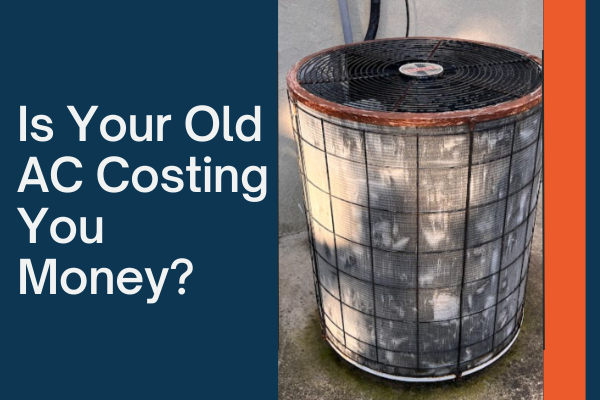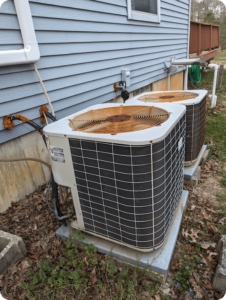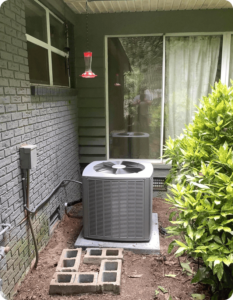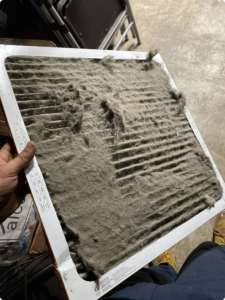
Is Your Old AC System Costing You Money?
Is Your Old Air Conditioner Costing You Money?
 Replacing your air conditioner is a big investment, and many people think that in order to save money, they need to use the old AC for as long as possible, even until it dies. However, if you are using an old air conditioner, it might be costing you more than you think.
Replacing your air conditioner is a big investment, and many people think that in order to save money, they need to use the old AC for as long as possible, even until it dies. However, if you are using an old air conditioner, it might be costing you more than you think.
Your energy bills are always going to rise when you turn the AC on, but they could be going up a bit more than they should. Understanding the lifespan of an air conditioner, the hidden costs of an old unit, and the benefits of upgrading to an energy-efficient model may help you make the right decision for your home or business.
If you want an expert’s opinion, give us a call or visit us online. The experts at Blue Ridge Heating and Air can come take a look at your air conditioner, and let you know if it’s time for an upgrade, or you simply need some routine maintenance to keep your AC working in tip-top shape!
How Long Does An Air Conditioner Last?
One of the key factors when you are deciding to replace your air conditioner is how old it is, and how long it will last. The lifespan of an air conditioner varies depending on several factors, including the brand, usage, maintenance, and environmental conditions. On average, a well-maintained air conditioner can last between 10 to 15 years. However, this duration can be significantly shortened if the unit is not properly maintained or if it is subjected to harsh operating conditions.
We’ve also seen some well maintained units last up to 20 years! It can vary depending on how well it’s taken care of. Regular maintenance, such as cleaning filters, checking refrigerant levels, and ensuring proper airflow, can extend the life of an air conditioner.
Additionally, regular service by professional technicians can identify and address potential issues before they become major problems. Despite these efforts, even the best-maintained units will eventually show signs of aging and decreased performance over the years, indicating that it may be time for a replacement.
How Is Your Old AC Costing You Money?
An aging air conditioner can lead to increased expenses in several ways. These costs can almost be hidden and can accumulate over time. Over the lifespan of your air conditioner, it could cost you thousands of dollars. Here are some of the primary ways your old AC might be draining your wallet:
Built Less Efficiently
 Older air conditioners were designed and manufactured with the technology available at the time, which may not be as efficient as modern units. As technology has advanced, newer air conditioners have become more energy-efficient, utilizing advanced components and materials that reduce energy consumption. An older unit may require more power to achieve the same level of cooling, leading to higher energy bills.
Older air conditioners were designed and manufactured with the technology available at the time, which may not be as efficient as modern units. As technology has advanced, newer air conditioners have become more energy-efficient, utilizing advanced components and materials that reduce energy consumption. An older unit may require more power to achieve the same level of cooling, leading to higher energy bills.
Recently, air conditioners in the United states have come under new regulations which require a certain level of energy efficiency. If you live in the Northern States, the minimum requirement is 14 SEER. If you live in the southern states, the requirement is 15 SEER. SEER is the rating of efficiency for air conditioners. The higher the SEER rating, the more energy efficient your system will run.
Where we are located in North Carolina and South Carolina, the minimum SEER rating allowed is 15. This means that if you have an older AC system, it’s very possible that you are using a less efficient model than a 15 SEER AC.
Normal Wear And Tear
Even if you have your system serviced every year, eventually there is going to be some normal wear and tear that hurts the energy efficiency. Over time, all mechanical systems experience wear and tear, and air conditioners are no exception. Components such as compressors, fans, and coils can degrade, leading to decreased efficiency and performance. This normal wear and tear can cause the unit to work harder to maintain the desired temperature, consuming more energy and increasing your utility bills.
Repairs And Breakdowns
Just like any machine, as air conditioners age, they become more prone to experiencing breakdowns and needing repairs. Frequent repairs not only disrupt your comfort but also add up in terms of costs.
In some cases, the cost of repairing an old unit may start to approach the price where it would make more sense to replace it. If your repair is in the 4 figures, you may want to look into new AC systems instead. Additionally, older units may use refrigerants that are no longer widely available, like R-22 (Freon), making repairs even more expensive.
Will An Energy Efficient AC Save Money?
Investing in an energy-efficient air conditioner can lead to significant savings over time. Modern units are designed to operate more efficiently, consuming less energy to achieve the same or better cooling performance. This efficiency translates directly into lower energy bills, making the initial investment in a new unit more cost-effective in the long run.
Energy-efficient air conditioners often come with advanced features such as programmable thermostats, variable-speed compressors, and improved filtration systems. These features not only enhance comfort and air quality in your home, but they also optimize your energy usage. This helps reduce energy costs and normal wear and tear. There are usually some rebates and discounts available for newer, energy efficient HVAC systems as well. Our experts can help you choose the right unit that will reduce your energy costs, as well as qualify for a discount!
How Do You Maintain Efficiency?
 Whether you have an old AC, or a brand new one, there are ways to make sure you are remaining energy efficient. Here are some tips to keep your unit running smoothly:
Whether you have an old AC, or a brand new one, there are ways to make sure you are remaining energy efficient. Here are some tips to keep your unit running smoothly:
- Regular Maintenance: This is the first and most important thing you can do for your AC. Schedule annual inspections with a professional technician to check for any issues and ensure the system is operating efficiently. Regular maintenance is also usually required to maintain your warranty as well.
- Clean or Replace Filters: Dirty filters can restrict airflow, causing the unit to work harder and consume more energy. Clean or replace filters regularly to maintain optimal airflow and efficiency. We recommend doing this once every 2-3 months.
- Seal and Insulate: Ensure that your home is properly sealed and insulated to prevent cool air from escaping. This reduces the workload on your air conditioner, improves overall efficiency, and improves your home comfort.
- Use a Programmable Thermostat: A programmable thermostat allows you to set temperature schedules, reducing energy usage when you are not at home. Some smart thermostats also learn over time, and can adjust your temperature to keep you comfortable, while also saving money.
Upgrading Your Air Conditioner
When your old air conditioner is no longer efficient or cost-effective to repair, upgrading to a new unit is a wise decision. Here are some considerations for choosing a new air conditioner:
- Energy Efficiency Rating: Look for units with a high Seasonal Energy Efficiency Ratio (SEER) rating. Higher SEER ratings indicate better efficiency and lower energy consumption.
- Proper Sizing: Ensure that the new unit is appropriately sized for your home. An undersized unit will struggle to cool your space, while an oversized unit will cycle on and off frequently, reducing efficiency. Bigger is not always better when it comes to your AC.
- Advanced Features: Consider units with advanced features such as variable-speed compressors, smart thermostats, and enhanced filtration systems. These features can improve comfort, air quality, and energy efficiency.
- Rebates and Incentives: Check for available rebates and incentives from utility companies or government programs. These can help offset the initial cost of a new unit. Our experts can help you out with this as well.
Do You Want To Upgrade Your AC?
Are you thinking about upgrading your air conditioning system? If you are, we can help! The experts at Blue Ridge Heating & Air can take a look at your AC, and let you know if it’s time for an upgrade. Give us a call or contact us online and we will make sure your space is cool and comfortable all Summer long!
